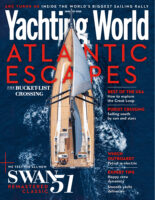Olympic Group skipper Manley Hopkinson is damp and cold – and missing the birds:
‘It puzzles me where they have gone. They were all around us yesterday, but today there are none. No albatross, no little dancing fairy prions, no chickens. Nothing. Perhaps they were offended by our meagre offerings. Perhaps it was the Tabasco that sent them packing. Maybe they got a whiff of better grub from the boys in front.
‘For days they have been with us, scouring our wake for a feed, but they entertain us no more. It has been a comfort to see other living creatures. Now the desolation and privation seems all that more real. To know that these small, seemingly delicate beings can survive in this environment was somehow reassuring.
‘Twenty four hours later and some are back. But they are not the same. Instead of Wandering or Sooty Albatross and the silver flitting prions we have some beautiful dusty brown streamlined birds constantly flying in carefully choreographed pairs. The silver prions have been superseded by brown and white swallow-shaped birds that seem to fly sideways with one wing touching the waves and the other catching the wind. They break the surface every couple of feet with their wing then twist and touch with there feet. A constant repetition of sleepless activity. No rest, just flight and a perpetual search for food. We are scorching along at 11-12 knots, but they can leave us standing with no perceived extra effort.
‘Reluctantly, the wind backed and allowed us to do as the others have apparently been doing for a while, to free off and reach at speed toward the crews’ deserved heroes welcome in Cape Town. I say reluctantly, for even though it was forecast to back, each time it gave a little it wanted to come back. The wind would back 20° then veer 15°. Back 10°, veer 5°. Little by little she gave way and did as she should.
‘The sailing last night was once again a real pleasure. For the first time since dropping south after Tasmania we were up on deck in just our mid-layer. I still had my woolly hat on and gloves were still needed on the helm, but it has marked another waypoint of this leg: the warmer climates.
‘As we press on north the temperature should rise further. It seems a very long time ago since my body felt the warmth of the sun. And it also seems to have been an age since we have been able to put on any dry clothes. All our kit has been damp since we entered the Southern Oceans. Our sleeping bags are wet and clinging to the bare skin. Every layer of clothing is cold to the touch through moisture. They warm with wearing but always have that clammy feel. Our foulies are permanently soaking, inside and out, from constant immersion.
‘Every surface of the interior is dripping in condensation. As you bounce down the passageways your thermals soak up the moisture and guard it jealously. There are so few spaces to dry your clothing. The generator space is by far the most efficient. It leaves every item with a faint smell of diesel, but the short-lived luxury of dry socks or gloves is worth any inconvenience.
‘Still, for me, the overriding memory of this incredible part of our planet will be the power, the majesty, the beauty and the serenity. The stories of cold and wet and the difficulties of daily life will of course be told to accentuate our achievement, but the final words will always focus on the mind-clearing magnificence of the untamed Southern Oceans, and how privileged we have been to be able to tell of it first hand.
‘It seemed as though there was no night yesterday, only a perpetual dawn. The moon was so bright behind the thin whisp of cloud that all was the expectant grey of dawn. Even the dusk did not exist, that is a different light altogether, bypassed from the grey day to the grey night.
‘Occasionally the moon’s light would burst through, the glittering path inviting you to enter a different world. I managed to squeeze in two hours at the helm, one in each watch.



